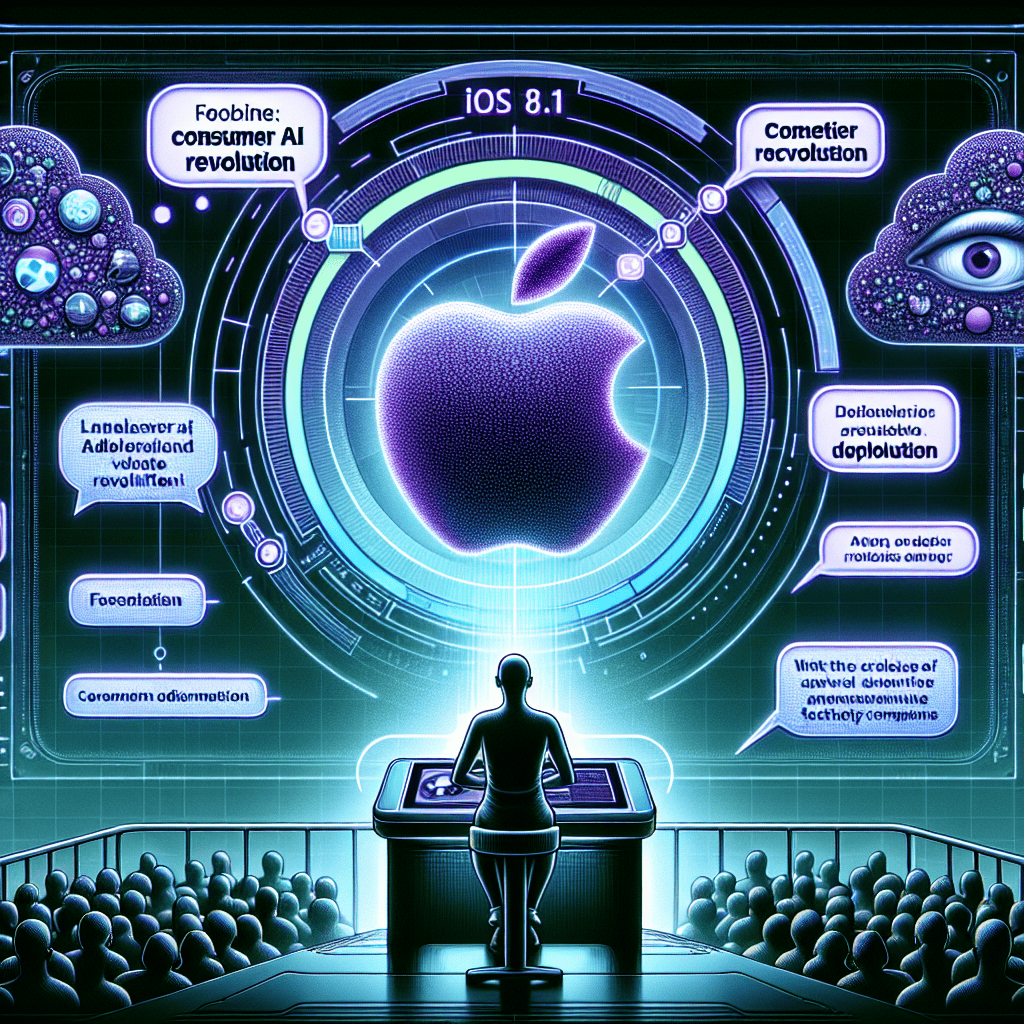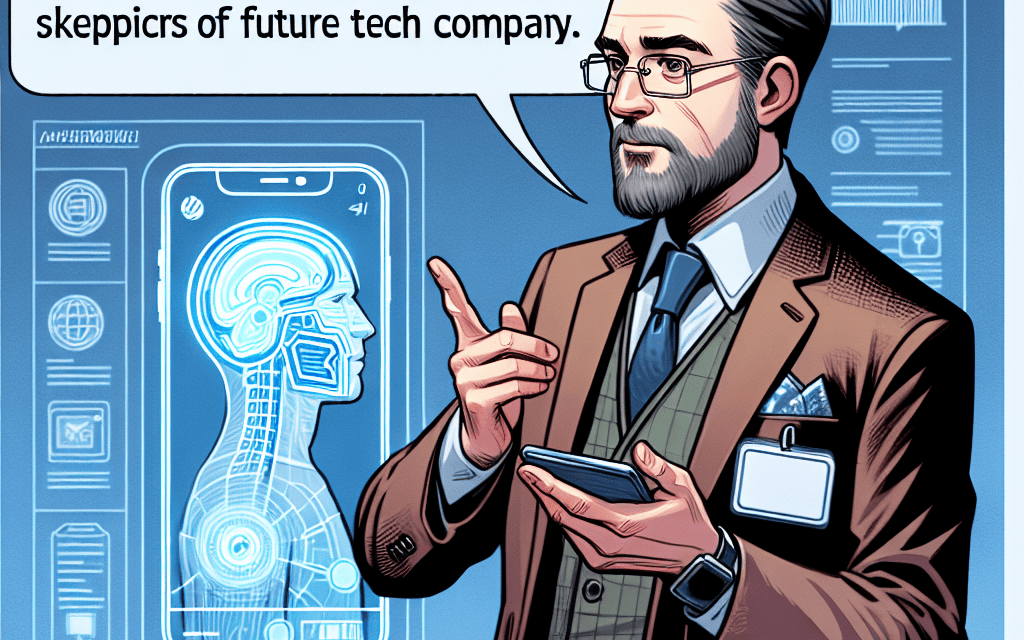“Dan Ives Predicts: iOS 18.1 Ignites Consumer AI Revolution, Silencing Apple Doubters!”
Introduction
Dan Ives, a prominent technology analyst, has projected a significant shift in the consumer technology landscape with the advent of what he terms the ‘Consumer AI Revolution,’ coinciding with the release of Apple’s iOS 18.1 update. Ives, known for his insightful analysis of tech industry trends, has dismissed skepticism surrounding Apple’s ability to innovate, emphasizing that the integration of advanced AI capabilities in consumer devices will redefine user experiences and drive substantial growth. This update is expected to enhance the functionality and intelligence of Apple’s ecosystem, positioning the company at the forefront of the AI-driven transformation in consumer technology.
Dan Ives Predicts Consumer AI Revolution with iOS 18.1 Update
In the ever-evolving landscape of technology, the intersection of artificial intelligence and consumer electronics continues to captivate both industry experts and everyday users. Dan Ives, a prominent analyst at Wedbush Securities, has recently made headlines with his bold prediction of a “consumer AI revolution” spurred by the upcoming iOS 18.1 update. This forecast comes at a time when Apple, a titan in the tech industry, faces skepticism from various quarters. However, Ives remains steadfast in his belief that the integration of advanced AI capabilities into Apple’s ecosystem will not only silence critics but also redefine user experiences.
The anticipated iOS 18.1 update is expected to introduce a suite of AI-driven features that promise to enhance the functionality and personalization of Apple devices. According to Ives, these advancements will mark a significant shift in how consumers interact with technology, moving beyond mere convenience to a more intuitive and seamless integration into daily life. The update is rumored to include improvements in Siri’s natural language processing, augmented reality applications, and personalized user interfaces, all powered by sophisticated AI algorithms. These enhancements are designed to make devices more responsive to individual user needs, thereby fostering a deeper connection between technology and its users.
Transitioning from speculation to tangible benefits, Ives argues that the consumer AI revolution will be characterized by a heightened level of personalization. As AI becomes more adept at understanding user preferences and behaviors, devices will be able to anticipate needs and offer solutions proactively. This shift towards anticipatory computing is expected to streamline tasks, reduce cognitive load, and ultimately enhance productivity. For instance, AI-driven reminders and suggestions could help users manage their schedules more efficiently, while personalized content recommendations could enrich entertainment experiences.
Despite the promising outlook, Apple faces a chorus of skepticism from those who question the company’s ability to maintain its innovative edge. Critics point to the competitive pressures from other tech giants and the challenges of integrating cutting-edge AI technologies without compromising user privacy. However, Ives dismisses these concerns, emphasizing Apple’s track record of successfully navigating technological shifts. He highlights the company’s commitment to privacy and security, noting that Apple’s approach to AI is likely to prioritize user trust, a factor that could differentiate it from competitors.
Moreover, Ives underscores the strategic importance of Apple’s vast ecosystem, which includes hardware, software, and services. This integrated approach provides a unique advantage in deploying AI capabilities across multiple platforms, ensuring a consistent and cohesive user experience. By leveraging its ecosystem, Apple can deliver AI innovations that are not only groundbreaking but also seamlessly integrated into the daily lives of its users.
In conclusion, Dan Ives’ prediction of a consumer AI revolution with the iOS 18.1 update paints a compelling picture of the future of technology. As Apple prepares to unveil its latest advancements, the potential for AI to transform consumer experiences is immense. While skepticism remains, Ives’ confidence in Apple’s ability to lead this revolution is rooted in the company’s history of innovation and its commitment to user-centric design. As the tech world eagerly awaits the release of iOS 18.1, the stage is set for a new era of AI-driven consumer technology that promises to redefine the relationship between humans and their devices.
How iOS 18.1 Update Could Transform Consumer AI
The release of Apple’s iOS 18.1 update has sparked significant interest in the tech community, particularly regarding its potential to revolutionize consumer artificial intelligence (AI). Dan Ives, a well-regarded analyst, has been vocal about the transformative impact this update could have, dismissing skeptics who doubt Apple’s ability to lead in the AI space. As the update rolls out, it is essential to understand how it could reshape consumer AI and why Ives remains optimistic about Apple’s future in this domain.
To begin with, the iOS 18.1 update introduces several enhancements that are poised to elevate the user experience through AI-driven features. One of the most notable improvements is the integration of more sophisticated machine learning algorithms, which enable devices to perform tasks with greater efficiency and accuracy. This advancement is expected to enhance functionalities such as voice recognition, image processing, and predictive text, making interactions with Apple devices more intuitive and seamless. Consequently, users can anticipate a more personalized and responsive experience, as their devices learn and adapt to their preferences over time.
Moreover, the update emphasizes privacy and security, which have been longstanding priorities for Apple. By leveraging on-device processing for AI tasks, iOS 18.1 minimizes the need to send data to external servers, thereby reducing potential vulnerabilities. This approach not only safeguards user information but also aligns with growing consumer demands for privacy-conscious technology. As a result, Apple is well-positioned to gain the trust of users who are increasingly wary of data breaches and privacy infringements.
In addition to these technical enhancements, the iOS 18.1 update is expected to catalyze the development of third-party applications that harness AI capabilities. By providing developers with more robust tools and frameworks, Apple is fostering an ecosystem where innovative AI-driven applications can thrive. This move is likely to spur creativity and competition among developers, leading to a proliferation of apps that offer unique and valuable functionalities. As these applications become more prevalent, consumers will have access to a broader array of AI-powered solutions that can simplify and enrich their daily lives.
Despite these promising developments, some skeptics remain unconvinced of Apple’s potential to dominate the consumer AI market. Critics argue that the company has been slow to adopt AI compared to competitors like Google and Amazon, which have made significant strides in this area. However, Dan Ives counters this narrative by highlighting Apple’s strategic approach to AI integration. Rather than rushing to release half-baked features, Apple has focused on refining its AI capabilities to ensure they meet the high standards of quality and reliability that users expect. This deliberate strategy, Ives contends, will ultimately pay off as Apple continues to roll out updates that enhance its AI offerings.
Furthermore, Ives points to Apple’s vast and loyal customer base as a critical advantage in the consumer AI revolution. With millions of users worldwide, Apple has a unique opportunity to introduce AI innovations on a massive scale. As more consumers adopt these technologies, the company can gather valuable insights and feedback to further refine its AI solutions. This iterative process is likely to result in continuous improvements that keep Apple at the forefront of consumer AI.
In conclusion, the iOS 18.1 update represents a significant step forward in Apple’s journey to revolutionize consumer AI. By enhancing device capabilities, prioritizing privacy, and fostering a vibrant developer ecosystem, Apple is well-equipped to lead in this rapidly evolving field. While skeptics may question the company’s AI ambitions, Dan Ives’ optimistic outlook suggests that Apple is poised to make a lasting impact on the way consumers interact with technology. As the update unfolds, it will be fascinating to observe how these advancements shape the future of consumer AI.
Dan Ives Dismisses Apple Skeptics Amid AI Advancements
In the ever-evolving landscape of technology, the intersection of artificial intelligence and consumer electronics has become a focal point for industry analysts and enthusiasts alike. Dan Ives, a prominent technology analyst, has recently articulated a compelling vision for what he terms the “Consumer AI Revolution,” particularly in light of Apple’s latest iOS 18.1 update. This perspective comes at a time when skepticism about Apple’s innovation trajectory has been mounting, yet Ives remains steadfast in his belief that the tech giant is poised to redefine consumer interaction with AI.
The release of iOS 18.1 marks a significant milestone in Apple’s journey towards integrating artificial intelligence more seamlessly into its ecosystem. This update is not merely a routine enhancement but a strategic move to embed AI capabilities deeper into the user experience. With features that leverage machine learning to offer more personalized and intuitive interactions, Apple is setting the stage for a new era where AI becomes an indispensable part of daily life. Ives argues that this development is indicative of a broader trend where AI will no longer be confined to niche applications but will permeate every aspect of consumer technology.
Transitioning from the technical aspects to the market implications, Ives dismisses the skepticism surrounding Apple’s ability to innovate. Critics have often pointed to a perceived stagnation in Apple’s product evolution, suggesting that the company has been resting on its laurels. However, Ives counters this narrative by highlighting Apple’s strategic investments in AI research and development. These investments, he asserts, are not immediately visible in hardware changes but are profoundly transformative in the software and services that define user experiences. The iOS 18.1 update, with its AI-driven enhancements, exemplifies this shift and underscores Apple’s commitment to leading the charge in consumer AI.
Furthermore, Ives emphasizes the potential economic impact of this AI integration. As AI becomes more embedded in consumer devices, it opens up new revenue streams for Apple through services and applications that capitalize on these advanced capabilities. This, in turn, could lead to a significant expansion of Apple’s ecosystem, attracting more developers and fostering innovation. The ripple effect of this could be substantial, as it may encourage other tech companies to accelerate their AI initiatives, thereby propelling the entire industry forward.
In addition to the economic implications, the societal impact of a consumer AI revolution cannot be overlooked. Ives suggests that as AI becomes more accessible and user-friendly, it will democratize technology, making advanced tools available to a broader audience. This democratization has the potential to enhance productivity, improve quality of life, and drive educational advancements. By integrating AI into everyday devices, Apple is not only enhancing its product offerings but also contributing to a larger societal shift towards embracing technology as a partner in daily activities.
In conclusion, Dan Ives’ insights into the consumer AI revolution, catalyzed by Apple’s iOS 18.1 update, offer a compelling counter-narrative to the skepticism that has surrounded the company. By focusing on the transformative potential of AI and its integration into consumer technology, Ives paints a picture of a future where Apple continues to lead through innovation. As AI becomes an integral part of the consumer experience, the implications for the tech industry, the economy, and society at large are profound, heralding a new era of technological advancement and opportunity.
The Role of iOS 18.1 in Shaping the Future of Consumer AI

The release of iOS 18.1 marks a significant milestone in the evolution of consumer artificial intelligence, a development that Dan Ives, a prominent technology analyst, believes will usher in a ‘Consumer AI Revolution.’ This update, which has been eagerly anticipated by both consumers and industry experts, is set to redefine the way users interact with their devices, offering a more seamless and intuitive experience. As Apple continues to innovate, it is crucial to understand how iOS 18.1 plays a pivotal role in shaping the future of consumer AI, while also addressing the skepticism that often surrounds such advancements.
To begin with, iOS 18.1 introduces a suite of AI-driven features that enhance user experience by leveraging machine learning and natural language processing. These technologies enable devices to better understand and predict user behavior, thereby offering personalized recommendations and automating routine tasks. For instance, the update includes an advanced version of Siri, which is now capable of engaging in more natural and context-aware conversations. This improvement not only makes interactions more efficient but also fosters a deeper connection between users and their devices.
Moreover, the integration of AI into iOS 18.1 extends beyond voice assistants. The update also enhances the functionality of various applications, such as the Photos app, which now uses AI to organize and curate images based on user preferences and past behavior. This level of personalization is indicative of a broader trend towards creating more intelligent and responsive devices that cater to individual needs. As a result, users can expect a more tailored and efficient experience, which is likely to increase overall satisfaction and engagement with Apple products.
Despite these advancements, there are those who remain skeptical about the implications of integrating AI into consumer technology. Critics often raise concerns about privacy and data security, questioning whether the benefits of AI outweigh the potential risks. However, Apple has consistently emphasized its commitment to user privacy, implementing robust security measures to protect personal information. With iOS 18.1, the company has introduced additional privacy features, such as on-device processing for certain AI functions, which minimizes the need to share data with external servers. This approach not only addresses privacy concerns but also reinforces Apple’s reputation as a leader in safeguarding user data.
Furthermore, Dan Ives dismisses the skepticism surrounding Apple’s AI initiatives, arguing that the company’s track record of innovation and user-centric design speaks for itself. He contends that the integration of AI into iOS 18.1 is a natural progression in Apple’s ongoing mission to enhance user experience and drive technological advancement. By focusing on creating intuitive and intelligent devices, Apple is well-positioned to lead the consumer AI revolution, setting a benchmark for other companies to follow.
In conclusion, the release of iOS 18.1 represents a significant step forward in the realm of consumer AI, offering users a more personalized and efficient experience. While skepticism persists, Apple’s commitment to privacy and innovation ensures that the benefits of AI integration are realized without compromising user trust. As Dan Ives suggests, this update is not just an incremental improvement but a harbinger of a broader transformation in how consumers interact with technology. As we move forward, it will be fascinating to observe how these advancements continue to shape the future of consumer AI, ultimately redefining the relationship between humans and their devices.
Why Dan Ives Believes in Apple’s AI Potential
Dan Ives, a prominent technology analyst, has recently articulated a compelling vision for Apple’s future, particularly in the realm of artificial intelligence. With the release of iOS 18.1, Ives foresees what he terms a “consumer AI revolution,” a development he believes will significantly enhance Apple’s standing in the tech industry. This perspective comes at a time when some skeptics have questioned Apple’s ability to innovate in the rapidly evolving AI landscape. However, Ives remains steadfast in his belief that Apple is well-positioned to leverage its existing ecosystem to drive substantial advancements in consumer AI.
To understand Ives’ optimism, it is essential to consider the broader context of Apple’s strategic initiatives. The company has consistently demonstrated a commitment to integrating cutting-edge technology into its products, thereby enhancing user experience. The iOS 18.1 update is a testament to this commitment, introducing a suite of AI-driven features designed to streamline daily tasks and improve device interactivity. These enhancements are not merely incremental; they represent a significant leap forward in how consumers interact with their devices, making technology more intuitive and accessible.
Moreover, Ives points to Apple’s robust ecosystem as a critical factor in its potential to lead the consumer AI revolution. Unlike many of its competitors, Apple has cultivated a seamless integration across its devices, from iPhones and iPads to Macs and Apple Watches. This interconnectedness allows for a more cohesive implementation of AI technologies, ensuring that users can enjoy a consistent and enhanced experience across all platforms. The synergy between hardware and software is a hallmark of Apple’s strategy, and it is this synergy that Ives believes will be instrumental in driving the adoption of AI technologies among consumers.
In addition to the technological advancements, Ives highlights Apple’s strong brand loyalty and expansive user base as pivotal elements in its AI strategy. With millions of dedicated users worldwide, Apple has a unique opportunity to introduce AI innovations to a receptive audience. This built-in customer base not only facilitates the rapid dissemination of new technologies but also provides valuable feedback that can be used to refine and improve AI applications. Consequently, Apple’s ability to engage directly with its users positions it advantageously in the competitive AI landscape.
Furthermore, Ives dismisses the skepticism surrounding Apple’s AI capabilities by emphasizing the company’s track record of overcoming challenges and setting industry standards. Critics often point to the competitive pressures from other tech giants as potential obstacles for Apple. However, Ives argues that Apple’s history of innovation and its strategic focus on user-centric design will enable it to navigate these challenges effectively. The company’s commitment to privacy and security also distinguishes it from many of its competitors, offering consumers a level of trust that is increasingly important in the digital age.
In conclusion, Dan Ives’ confidence in Apple’s AI potential is rooted in a comprehensive understanding of the company’s strategic advantages and its ability to harness these strengths to drive innovation. The iOS 18.1 update is more than just a software enhancement; it is a catalyst for what Ives envisions as a transformative era in consumer technology. By leveraging its ecosystem, brand loyalty, and commitment to user experience, Apple is poised to lead the charge in the consumer AI revolution, proving its skeptics wrong and reaffirming its position as a pioneer in the tech industry.
Consumer AI Revolution: Insights from Dan Ives on iOS 18.1
In the ever-evolving landscape of technology, the intersection of artificial intelligence and consumer electronics continues to captivate both industry experts and everyday users. Dan Ives, a prominent analyst known for his insightful perspectives on technology trends, has recently turned his attention to the latest developments from Apple. With the release of iOS 18.1, Ives envisions a ‘Consumer AI Revolution’ that promises to redefine the way users interact with their devices. This optimistic outlook comes at a time when skepticism about Apple’s innovation capabilities has been on the rise, yet Ives remains steadfast in his belief that the tech giant is poised to lead the charge in consumer AI.
The iOS 18.1 update, according to Ives, is a pivotal moment for Apple, marking a significant leap forward in integrating artificial intelligence into its ecosystem. This update is not merely a collection of incremental improvements but rather a comprehensive enhancement that leverages AI to deliver a more personalized and intuitive user experience. For instance, the update introduces advanced machine learning algorithms that enable devices to better understand user preferences and habits, thereby offering more relevant suggestions and automating routine tasks. This level of personalization, Ives argues, is a testament to Apple’s commitment to harnessing AI in a way that genuinely enhances the consumer experience.
Moreover, Ives highlights the seamless integration of AI across Apple’s suite of products as a key factor in this anticipated revolution. The ability of iOS 18.1 to synchronize with other Apple devices, such as the Apple Watch and MacBook, ensures that users can enjoy a cohesive and interconnected experience. This interoperability is crucial in fostering an ecosystem where AI can thrive, as it allows for the continuous flow of data and insights across devices, ultimately leading to smarter and more efficient technology.
Despite the enthusiasm surrounding these advancements, there are those who remain skeptical of Apple’s trajectory in the AI domain. Critics argue that the company has been slow to adopt AI compared to its competitors, and some question whether the iOS 18.1 update is enough to close the gap. However, Ives dismisses these concerns, emphasizing that Apple’s approach to AI has always been measured and deliberate. He contends that the company’s focus on privacy and security has necessitated a more cautious integration of AI, ensuring that user data is protected while still delivering cutting-edge features.
Furthermore, Ives points out that Apple’s vast and loyal customer base provides a unique advantage in the AI race. With millions of users worldwide, the company has access to an unparalleled wealth of data that can be used to refine and enhance its AI capabilities. This, coupled with Apple’s robust hardware and software ecosystem, positions the company to capitalize on the growing demand for AI-driven solutions.
In conclusion, Dan Ives’ insights into the ‘Consumer AI Revolution’ sparked by iOS 18.1 offer a compelling narrative of innovation and potential. While skepticism persists, Ives’ analysis underscores the transformative impact that AI can have on consumer technology, particularly when executed with precision and foresight. As Apple continues to push the boundaries of what is possible with AI, it is clear that the company remains a formidable force in shaping the future of technology. Through strategic updates like iOS 18.1, Apple not only addresses current consumer needs but also sets the stage for a new era of intelligent and intuitive devices.
Apple’s iOS 18.1 Update: A Catalyst for AI Innovation According to Dan Ives
In the ever-evolving landscape of technology, Apple’s iOS updates have consistently been a focal point for both enthusiasts and skeptics alike. The recent release of iOS 18.1 has sparked a wave of discussions, particularly concerning its implications for artificial intelligence (AI) integration. Dan Ives, a prominent technology analyst, has weighed in on the matter, predicting a ‘consumer AI revolution’ that could redefine how users interact with their devices. This perspective comes at a time when Apple faces scrutiny from skeptics who question the company’s ability to innovate in a rapidly changing tech environment.
The iOS 18.1 update is not merely a routine enhancement but a strategic move by Apple to embed AI more deeply into its ecosystem. This update introduces a suite of AI-driven features designed to enhance user experience, ranging from more intuitive Siri interactions to advanced machine learning capabilities that personalize device functionality. According to Ives, these advancements are not just incremental improvements but represent a significant leap towards a more AI-centric user experience. He argues that this shift will catalyze a broader consumer AI revolution, positioning Apple at the forefront of this transformative wave.
Transitioning from traditional software updates to AI-focused innovations, Apple is setting the stage for a new era of consumer technology. Ives emphasizes that the integration of AI into iOS 18.1 is a testament to Apple’s commitment to pushing the boundaries of what is possible with mobile technology. This commitment is evident in features such as real-time language translation, enhanced image recognition, and predictive text capabilities that learn and adapt to user behavior. These features not only improve functionality but also create a more seamless and intuitive user experience, which Ives believes will be a key driver of consumer adoption.
Despite the optimism surrounding these developments, Apple faces its share of skeptics who question the company’s ability to maintain its innovative edge. Critics argue that Apple’s recent updates have been more evolutionary than revolutionary, suggesting that the company is playing catch-up rather than leading the charge. However, Ives dismisses these concerns, asserting that Apple’s strategic focus on AI is a clear indication of its long-term vision. He points out that the company’s robust ecosystem, combined with its vast resources and talent pool, positions it uniquely to capitalize on the growing demand for AI-driven solutions.
Furthermore, Ives highlights that Apple’s approach to AI is not just about adding new features but about creating a cohesive and integrated experience that enhances the overall value of its products. This holistic approach is what sets Apple apart from its competitors, who may offer similar technologies but lack the seamless integration that Apple is known for. As consumers increasingly seek out devices that offer more than just basic functionality, Apple’s focus on AI could prove to be a decisive factor in maintaining its market leadership.
In conclusion, the iOS 18.1 update represents more than just a software enhancement; it is a strategic pivot towards a future where AI plays a central role in consumer technology. Dan Ives’ prediction of a ‘consumer AI revolution’ underscores the potential impact of these developments, suggesting that Apple is well-positioned to lead this charge. While skeptics may continue to question Apple’s innovative capabilities, the company’s focus on AI integration demonstrates a clear commitment to shaping the future of technology. As the tech landscape continues to evolve, Apple’s strategic investments in AI could very well redefine the way consumers interact with their devices, heralding a new era of innovation and user engagement.
Q&A
1. **Who is Dan Ives?**
Dan Ives is a well-known technology analyst, often providing insights and forecasts about major tech companies and industry trends.
2. **What is the ‘Consumer AI Revolution’ that Dan Ives foresees?**
Dan Ives predicts a significant shift in consumer technology driven by advancements in artificial intelligence, particularly as it becomes more integrated into everyday consumer products and services.
3. **What is the significance of the iOS 18.1 update in this context?**
The iOS 18.1 update is seen as a pivotal moment for Apple, potentially introducing new AI-driven features that could enhance user experience and drive the consumer AI revolution.
4. **How does Dan Ives view Apple skeptics in light of the iOS 18.1 update?**
Dan Ives dismisses Apple skeptics, suggesting that they underestimate the impact of Apple’s innovations and the potential of the iOS 18.1 update to drive growth and consumer engagement.
5. **What potential features might be included in the iOS 18.1 update?**
While specific features are speculative, the update might include enhanced AI capabilities, improved Siri functionality, and more personalized user experiences.
6. **Why is the consumer AI revolution important for Apple?**
The consumer AI revolution is crucial for Apple as it positions the company at the forefront of technological innovation, potentially increasing its market share and solidifying its leadership in the tech industry.
7. **What impact could the iOS 18.1 update have on Apple’s market position?**
The iOS 18.1 update could strengthen Apple’s market position by attracting more users, increasing customer loyalty, and setting new standards for AI integration in consumer technology.
Conclusion
Dan Ives anticipates a significant “Consumer AI Revolution” driven by the iOS 18.1 update, countering skepticism surrounding Apple’s innovation capabilities. He suggests that this update will enhance AI integration into consumer products, reinforcing Apple’s position as a leader in technology and innovation. Ives dismisses critics by highlighting Apple’s consistent track record of leveraging software updates to drive consumer engagement and market growth, suggesting that the iOS 18.1 update will further solidify Apple’s dominance in the AI space.





